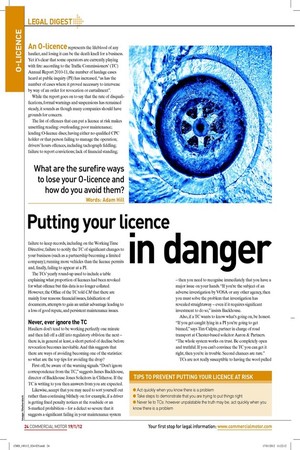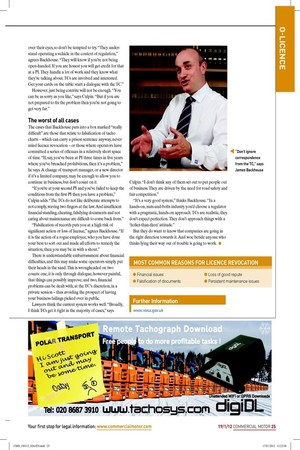Putting your licence
Page 19

Page 20

If you've noticed an error in this article please click here to report it so we can fix it.
in danger
What are the surefire ways to lose your O-licence and how do you avoid them?
Words: Adam Hill
An O-licence represents the lifeblood of any haulier, and losing it can be the death knell for a business. Yet it’s clear that some operators are currently playing with ire: according to the Trafic Commissioners’ (TC) Annual Report 2010-11, the number of haulage cases heard at public inquiry (PI) has increased, “as has the number of cases where it proved necessary to intervene by way of an order for revocation or curtailment” .
While the report goes on to say that the rate of disqualiications, formal warnings and suspensions has remained steady, it sounds as though many companies should have grounds for concern.
The list of offences that can put a licence at risk makes unsettling reading: overloading; poor maintenance; lending O-licence discs; having either no qualiied CPC holder or that person failing to manage the operation; drivers’ hours offences, including tachograph iddling; failure to report convictions; lack of inancial standing; failure to keep records, including on the Working Time Directive; failure to notify the TC of signiicant changes to your business (such as a partnership becoming a limited company); running more vehicles than the licence permits and, inally, failing to appear at a PI.
The TCs’ yearly round-up used to include a table explaining what proportion of licences had been revoked for what offence but this data is no longer collated. However, the Ofice of the TC told CM that there are mainly four reasons: inancial issues, falsiication of documents, attempts to gain an unfair advantage leading to a loss of good repute, and persistent maintenance issues.
Never, ever ignore the TC
Hauliers don’t tend to be working perfectly one minute and then fall off a cliff into regulatory oblivion the next – there is, in general at least, a short period of decline before revocation becomes inevitable. And this suggests that there are ways of avoiding becoming one of the statistics: so what are the top tips for avoiding the drop?
First off, be aware of the warning signals. “Don’t ignore correspondence from the TC,” suggests James Backhouse, director of Backhouse Jones Solicitors in Clitheroe. If the TC is writing to you then answers from you are expected.
Likewise, accept that you may need to sort yourself out rather than continuing blithely on: for example, if a driver is getting ixed penalty notices at the roadside or an S-marked prohibition – for a defect so severe that it suggests a signiicant failing in your maintenance system – then you need to recognise immediately that you have a major issue on your hands. “If you’re the subject of an adverse investigation by VOSA or any other agency, then you must solve the problem that investigation has revealed straightaway – even if it requires signiicant investment to do so,” insists Backhouse.
Also, if a TC wants to know what’s going on, be honest. “If you get caught lying in a PI you’re going to get binned,” says Tim Culpin, partner in charge of road transport at Chester-based solicitor Aaron & Partners. “The whole system works on trust. Be completely open and truthful. If you can’t convince the TC you can get it right, then you’re in trouble. Second chances are rare.” TCs are not really susceptible to having the wool pulled over their eyes, so don’t be tempted to try. “They understand operating a vehicle in the context of regulation,” agrees Backhouse. “They will know if you’re not being open-handed. If you are honest you will get credit for that at a PI. They handle a lot of work and they know what they’re talking about. TCs are involved and interested. Get your cards on the table: start a dialogue with the TC.” However, just being contrite will not be enough. “You can be as sorry as you like,” says Culpin. “But if you are not prepared to ix the problem then you’re not going to get very far.”
The worst of all cases
The cases that Backhouse puts into a box marked “really dificult” are those that relate to falsiication of tacho charts – which can carry a prison sentence anyway, never mind licence revocation – or those where operators have committed a series of offences in a relatively short space of time. “If, say, you’ve been at PI three times in ive years where you’ve breached prohibitions, then it’s a problem,” he says. A change of transport manager, or a new director if it’s a limited company, may be enough to allow you to continue in business, but don’t count on it.
“If you’re at your second PI and you’ve failed to keep the conditions from the irst PI then you have a problem,” Culpin adds. “The TCs do not like deliberate attempts to not comply, waving two ingers at the law. And insuficient inancial standing, cheating, falsifying documents and not caring about maintenance are dificult to come back from.” “Falsiication of records puts you at a high risk of signiicant action or loss of licence,” agrees Backhouse. “If it is the action of a rogue employee, who you have done your best to sort out and made all efforts to remedy the situation, then you may be in with a shout.” There is understandable embarrassment about inancial dificulties, and this may make some operators simply put their heads in the sand. This is wrongheaded on two counts: one, it is only through dialogue, however painful, that things can possibly improve; and two, inancial problems can be dealt with, at the TC’s discretion, in a private session – thus avoiding the prospect of having your business failings picked over in public.
Lawyers think the current system works well. “Broadly, I think TCs get it right in the majority of cases,” says Culpin. “I don’t think any of them set out to put people out of business. They are driven by the need for road safety and fair competition.” “It’s a very good system,” thinks Backhouse. “In a hands-on, nuts-and-bolts industry you’d choose a regulator with a pragmatic, hands-on approach. TCs are realistic, they don’t expect perfection. They don’t approach things with a ‘holier-than-thou’ attitude.” But they do want to know that companies are going in the right direction towards it. And woe betide anyone who thinks lying their way out of trouble is going to work. ■
MOST COMMON REASONS FOR LICENCE REVOCATION
• Financial issues • Loss of good repute • Falsification of documents • Persistent maintenance issues
Further Information
www.vosa.gov.uk
TIPS TO PREVENT PUTTING YOUR LICENCE AT RISK
• Act quickly when you know there is a problem • Take steps to demonstrate that you are trying to put things right • Never lie to TCs: however unpalatable the truth may be, act quickly when you know there is a problem












































